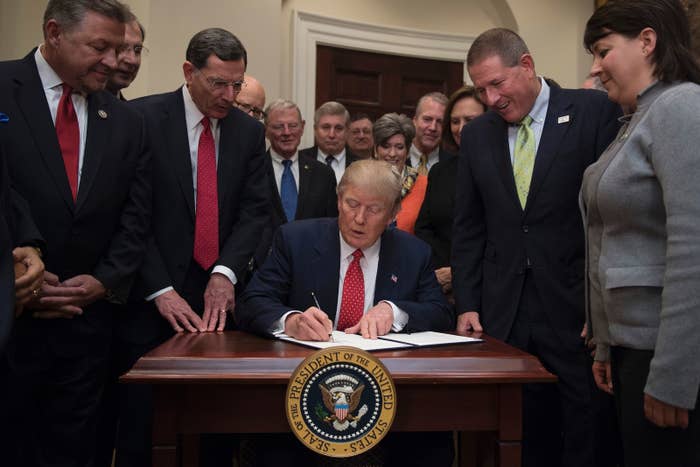
On Tuesday, President Trump ordered government agencies to begin unraveling one of his predecessor’s signature environmental regulations, meant to protect more US waterways from pollution.
Trump signed the executive order — through which Trump calls for Scott Pruitt, the new administrator of the Environmental Protection Agency, and the Army Corps of Engineers to “review” the rule — surrounded by Pruitt and about 25 farmers, homebuilders and politicians in the White House.
"We're going to free up our country, and it's going to be done in a very environmental and positive environmental way, I will tell you that," Trump said at the signing. Adding that "so many jobs are delayed for many years," he promised the eventual withdrawal of the water pollution rule will boost employment.
Obama’s water rule, issued in 2015 and called the Waters of the United States (or WOTUS) rule, sought to clear up long-standing confusion over which waterways fall under the justification of the 45-year-old Clean Water Act, the nation’s main water pollution law.
The law gave the federal government power to take steps to stop pollution in “navigable waters” in the US, leaving up to the courts which waterways meet that definition. In a tight 4-1-4 decision in 2006, the Supreme Court issued a ruling, written by Justice Anthony Kennedy, that set a test for which waterways should be considered navigable.
But through the 2015 rule, Obama swelled the number of streams and swamps that fall under federal protection in order to ensure, his administration said, 117 million people in the US have safe drinking water.
But critics of the rule — most notably Pruitt, who through a lawsuit as Oklahoma’s attorney general successfully stopped the rule from taking effect — say the rule unduly expands federal power to shallow marshes and dry streambeds that would be difficult to impossible for a boat to navigate. Many politicians with large rural constituencies oppose the rule because they feel it infringes on the rights of landowners, such as farmers who use fertilizer and may be newly subject to federal water pollution oversight.
“The agency believes that unless it controls all of our nation’s water, this resource is not protected.” Sen. John Boozman of Arkansas said when the rule was finalized in 2015. “This couldn’t be further from the truth.”
On Saturday at the Conservative Political Action Conference, Pruitt said he will work with states as he begins to “deal with Waters of the United States.”
As justification for undoing the rule, the White House resurrected the spirit of Antonin Scalia.
With the order, Trump asks Pruitt and other government officials to rewrite the rules in line with the interpretation of Scalia, who wrote the minority opinion in the 2006 case. The late Supreme Court justice was, according to a White House official who briefed reporters on the executive order, more “narrow in his approach.”
During the campaign, Trump vowed to rescind Obama’s water rule within his first 100 days in office.
While Trump has begun that process on Tuesday, getting rid of the rule may take longer than Trump’s 100-day mark in office — perhaps even longer than his entire presidential term — due to the lengthy rulemaking process and potential lawsuits facing the administration over repealing the rule.
Nothing will happen immediately with the stroke of Trump’s pen. Just as when Obama’s water rule had to go through a lengthy comment period before being issued — a process designed to allow members of the public to explain to the government how they think an environmental regulation will affect them, for better or worse — undoing the rule requires a similar public airing as well.
“Only a new rule based on a new record can make current rules go away,” Gina McCarthy, a former EPA administrator in the Obama administration, said in a statement. “The only thing these orders do is make clear this Administration will defer needed public health protections for the American people for the sake of partisan politics.”
Environmental groups and prosecutors in left-leaning states will likely voice their concerns during the comment period, but they are cautious to commit to suing yet. Any lawsuit, if filed, could also slow down the Trump administration’s effort to undo the rule.
“We’ll be monitoring the full impact of the executive order on our nation’s waters,” Navis Bermudez, deputy legislative director of the Southern Environmental Law Center, which operates in six Southern states, told BuzzFeed News.
Adrian Carrasquillo contributed reporting.
